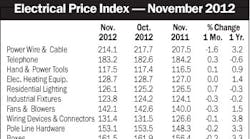Thomas & Betts Corp., Memphis, Tenn., said it will discontinue the manufacture and sales of several product lines, including metering equipment, safety switches, meter packs and residential load centers.
The move, which includes product lines that came with its acquisition of Anchor Electric and the 1994 purchase of portions of the Challenger/Westinghouse circuit protection line, is part of the company's strategy to focus on its core industrial and commercial business. The products that will be discontinued accounted for approximately 3 percent of the annual sales of T&B's electrical division, said Nick Cassella, vice president, global marketing for that division.
While T&B will no longer manufacture residential load centers, the company will continue to manufacture and sell residential circuit breakers, including classified breakers, T&B residential breakers, molded-case circuit breakers and Zinsco circuit breakers, said Cassella.
With the discontinuation of the Anchor product, T&B will close its factory that made those products in Monterrey, Mexico. T&B did not disclose the exact number of personnel that will be affected by the plant closure, but said it would transfer its management team at the Monterrey facility to other T&B facilities in Monterrey.
T&B originally bought the Anchor metering equipment line and the other products affected by this announcement to build its residential platform. But Cassella said the company is discontinuing these businesses because it was not getting the volume of business it needed from load centers, and because the Anchor business — while a good business — was not a focus for T&B's salespeople.
“Our sales force really didn't call on the residential market, and the distributors that they call on tended to be industrial-focused from T&B or some commercial/residential focus from the old American Electric.”
T&B bought Anchor Electric, Manchester, N.H., in 1994. The company later moved the manufacturing of Anchor's products to Monterrey, Mexico. T&B purchased the other products affected by this announcement from Eaton Corp., Cleveland, in 1994. At that time, Eaton had acquired Westinghouse Corp.'s Distribution and Control Business Unit. But in order to complete the deal, the Justice Department asked the company to divest a package of products sold under the Westinghouse and Challenger brand names, including residential circuit breakers, switches, metering devices and load centers, and it sold those lines to T&B.
Going forward, Cassella said T&B's focus will be back on the industrial and commercial lines, and added that the company is now launching several major marketing initiatives to support this focus. “We look at our business with roughly 10 to 12 core product lines,” he said. “We need to do better with our ties and terminals package for the OEMs, and we need to get back some of the share that we lost on our computer transistion. That's all starting to happen. We had a very good February.”
Cassella said the company has spoken to T&B independent manufacturers' reps at the recent National Association of Electrical Distributors (NAED) regional meeting in Tampa, and at the NEMRA annual meeting in Dallas.
Gene Biben of Joseph E. Biben Sales Corp., Philadelphia, a full-line T&B representative whose agency sold a high volume in the discontinued T&B lines, understands the need for the changes by T&B. However, Biben said that this move by T&B forces reps to choose between downsizing their organizations and looking for new ways of making up lost income, whether that be through existing product lines or searching for additional ones. For Biben, downsizing is not an option.
“I think manufacturers may need to get healthy by doing exactly what T&B is doing — getting rid of non-profitable product lines or by laying people off. Manufacturers' reps, because we're relatively small, don't have a lot of laying-off that we can do without significantly affecting our capabilities. I'm not willing to do that.”

